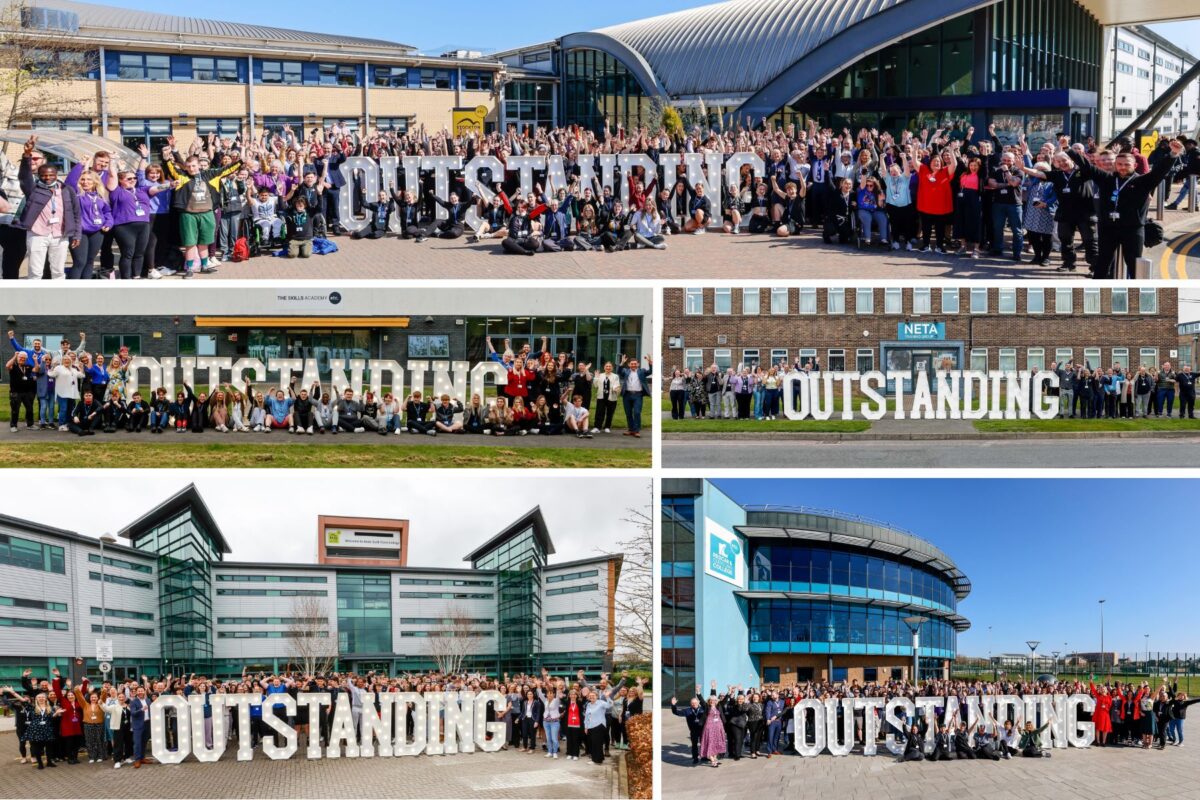Will 100k More Apprenticeships Bridge or Break the Skills Gap? FE Soundbite Edition 748

Welcome to FE Soundbite Edition 748, 1st June 2024: Will 100k More Apprenticeships Bridge or Break the Skills Gap?
This is the weekly e-newsletter and e-journal by FE News: ISSN 2732-4095. We know life is busy, so here is a snapshot of the latest announcements and epic thought leadership articles, from sector influencers and cool thinkers across FE and Skills this week on FE News
Gavin’s Reflective Perspective
As we dive into another week packed with insightful thought leadership articles and noteworthy developments in the world of Further Education, Work Based Learning and Skills it’s crucial to take a moment to reflect on the key themes and issues that have emerged.
Our top three thought leadership articles this week have really hit the nail on the head when it comes to some of the most pressing issues in the sector. Sheetal Choraria and Thomas Burton have brought their A-game, shedding light on the need to stay on top of global skill trends, the importance of Self-Assessment Reports and Quality Improvement Plans, and the whole debate around degree apprenticeships and traditional degrees after the 100,000 Apprenticeships pledge by the Conservative party earlier this week. It’s great to see these experts putting their thoughts out there and pushing for a more well-rounded approach to education and skills development.
But wait, there’s more! We’ve also had some seriously cool exclusives this week, covering everything from digital sustainability in education to the role of AI in further education and how SMEs can make the most of the AoC Report and Flexible AI Upskilling Fund (I really enjoyed Richard Foster Fletcher‘s article on this). It’s awesome to see the sector embracing these forward-thinking ideas and exploring new ways to leverage technology to help learners and educators alike.
Now, let’s keep it real – it’s not all sunshine and rainbows. The Conservative Party’s plan to boost apprenticeships by 100,000 per year is a noble goal, but at the expense of ‘rip off degrees’ is a bit polarising in my mind. It reminded me of that time when a certain Skills Minister went on about ITP’s taking FE Colleges ‘lunch money’ with Apprenticeship funding, which wasn’t helpful for a joined-up sector. Tom Burton has written two articles this week, loved his second article: Degree Apprenticeships vs Full-time Degrees: A False Dichotomy in the Election Debate
Moreover, according to research by the Liberal Democrats, the number of apprenticeship starts in England has dropped by a staggering 172,000 (one-third) since 2015/16. This revelation exposes what the Lib Dems call the Conservative Government’s “legacy of failure” in supporting apprenticeships, despite their recent pledge.
To make matters worse, the Learning and Work Institute has highlighted that government cuts to skills funding in England, totalling £1 billion since 2010, have disproportionately impacted people in the poorest areas and with the lowest qualifications. This has led to a 27% decrease in publicly funded learners from the most deprived areas. The UK’s skills base risks plateauing mid-table in the OECD at an estimated opportunity cost to the economy of £20 billion a year due to these cuts and an inability to meet demand for skills, contributing to low economic growth over the past 15 years.
We need a joined-up and big-picture sector, that encourages Level 2 to Level 7 and into lifelong learning, real careers advice at each stage, real scope to progress, incentives for people to upskill, reskill and be more productive and enjoy their learning, their jobs and their life.
Now more Apprenticeships are great…. but we also need to look big picture and not be, more Apprenticeships yeah… Degrees boo! It doesn’t work like that for learners and employers… nor educators… so we have asked for a bunch of articles to unpack this more and explore what we really need for a joined up and holistic post 16, work based learning, Apprenticeship, Higher Education and Lifelong learning sector.
Looking ahead, we need to keep the conversation going about supporting our neurodivergent colleagues and fostering a sense of belonging in our educational settings. By creating an environment where everyone feels valued and included, we can unlock the full potential of our learners and workforce.
So, let’s roll up our sleeves and keep pushing for collaboration, innovation, and a shared vision of a thriving further education sector that works for everyone. Together, we’ve got this!.. and I think we need to feed this back to the next political powers that be.
Our Top 3 Thought Leadership Articles This Week
Firstly Adapting to Global Skill Trends: Emerging Markets By Sheetal Choraria, Director of Global Business Development at NCC Education, emphasises the importance of IT and Business graduates in emerging markets staying current with global and regional skill trends to succeed in a rapidly changing job market.
Secondly The SAR and QIP – And why these should still be your “go-to” Ofsted Documents By Thomas Burton, Head of Apprenticeship Delivery, York St John University, highlights the importance of Self-Assessment Reports and Quality Improvement Plans as crucial tools for Ofsted readiness and continuous improvement.
Tom Burton wasn’t finished with his show stopper on how to support other people with Ofsted… he wrote a really cool reflective piece on the 100,000 Apprenticeships announcement, as Tom knows both sids of the fence well. So I’d recommend checking out: Degree Apprenticeships vs Full-time Degrees: A False Dichotomy in the Election Debate. By Thomas Burton, Head of Apprenticeship Delivery, York St John University, Tom argues against the flawed portrayal of apprenticeships and traditional degrees as mutually exclusive, calling for a holistic approach that values both.
This Week, We Have Also Had Some Other Epic Exclusives
Let’s make digital sustainability in education a norm, not just a nice to have By Cal Innes, sustainability subject specialist at Jisc
The Integration of AI in Further Education: Augmenting, Not Replacing, Educators By Gary Fisher, Senior Learning Designer, University of Derby
How SMEs and Educators Can Leverage the AoC Report and Flexible AI Upskilling Fund By Richard Foster-Fletcher, Chair of Morality and Knowledge in Artificial Intelligence (MKAI)
What’s New in the World of FE?
Conservatives aim to boost Apprenticeships by 100,000 per year to replace ‘rip off’ Degrees By The Conservative Party
- The Conservative Party plans to create 100,000 new apprenticeships annually by 2029/30 at an estimated cost of £885 million, funded by shutting down ‘underperforming university courses’ and redirecting students to employment or better-performing programs.
Number of starting apprenticeships in England has fallen by a third By The Liberal Democrats
- The number of apprenticeship starts in England has dropped by 172,000 (one-third) since 2015/16, according to House of Commons Library research analyzed by the Liberal Democrats, revealing the Conservative government’s “legacy of failure” in supporting apprenticeships.
Cuts to skills funding hit poorest areas hardest and put £20 billion of economic growth at risk By Learning and Work Institute
- The UK’s skills base risks plateauing mid-table in the OECD at an estimated opportunity cost to the economy of £20 billion a year due to cuts in skills budgets and an inability to meet demand for skills, contributing to low economic growth over the past 15 years.
- Government cuts to skills funding in England, totaling £1 billion since 2010, have disproportionately impacted people in the poorest areas and with the lowest qualifications, leading to a 27% decrease in publicly funded learners from the most deprived areas.
It is 2024, why is being a neurodivergent employee so challenging? By Sarah Aray, Public Relations and Communications Officer, Happy Autistic Lady
- Despite the legal protections and entitlements for neurodivergent people, at least 50% of neurodivergent employees don’t feel supported by their colleagues and employers, leading to low productivity, poor retention rates, and low employee satisfaction.
- Only 22% of autistic individuals are in employment, even though they have the willingness and capability to work, highlighting the lack of support and understanding in the current corporate world.
How creating a culture of belonging can support students’ well-being and performance By Nicola Pearce, Head of Education at BenQ
- Establishing a culture of belonging in educational settings is essential for students’ overall well-being and success, as it reduces stress levels, anxiety, and loneliness while fostering a motivational environment that values students’ individualities and capabilities.
- Creating a culture of belonging requires intentional strategies, such as encouraging students to share their unique backgrounds and perspectives, offering a culturally relevant curriculum, and using technology to facilitate collaboration and access to diverse content.
In The Know
Here are some cool articles to look out for next week only on FE News:
- The Skills Network
- Dell Technologies
- Workpays
By Danny O’Meara, Digital Project Manager, FE News
By Gavin O’Meara, CEO & Founder, FE News & FE Careers











Responses